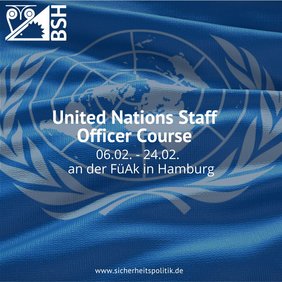Starting with the basics about the United Nations as an intergovernmental organisation and the Security Council as the mandating body of a peacekeeping mission, we learned about the different pillars and their respective tasks. Since the course is mainly undertaken by and for military personnel, the different aspects in working culture between military and civilian staff were emphasized to create a common understanding of how to work together most effectively. Adding to this, Col. Wiedekind - the officer in charge of the course - stressed how important it is that civilian experts also attend the course. This way, the military staff could be better prepared for their role in a UN mission where the military is after all just a part of the broader multidimensional picture.
This diversity in personal backgrounds and nationalities that the participants will work with later on was also reflected by the lecturers ranging from scientists, civilian experts with mission experience over to former diplomats as well as police and military officers. Of special interest was the lecture Mr. Martin Kobler, a retired German diplomat, gave about his time as Special Representative of the Secretary General (SRSG) in MONUSCO – the UN mission in the Democratic Republic of Congo. Since the SRSG is the head of a mission it was very exciting to hear about what practical problems can occur in coordinating and leading a UN mission especially since sometimes other UN organisations are present in a country but not part of the peacekeeping mission. He also talked with us about the importance and challenges when it comes to the protection of civilians and that in the case of MONUSCO even force was sometimes necessary to live up to that.
It was in general very fruitful that some participants in the course already had previous experience of serving with the United Nations e.g. in Mali, South Sudan or Lebanon. This also made it easier to relate the lectures to the reality on the ground, as in addition to the lecturers, some experienced participants were also able to give examples.
During the course, it also became clear that UN missions always operate in a field between aspiration and reality and that in some situations there can be a gap between these for political, financial or mandate-related reasons. With regard to the issue of local ownership, the limits of what a UN mission can achieve were also revealed. Ultimately, a peacekeeping mission is in an impartial actor in a conflict - even if it is not neutral with regard to the protection of civilians.
The lessons not only gave a good picture of the organisational, political and legal aspects of an operation, but also of which concepts and methods are useful for building a lasting peace. We therefore spoke in depth about disarmament, demobilisation and reintegration programmes, security sector reform and the rule of law. Special emphasis was also placed on topics such as women and gender in conflict, human rights and the protection of civilians.
For the final three days of the course we were challenged to use the skills and the knowledge we had gathered so far in the MAPEX exercise where we were put in charge of a UN mission headquarter in Carana, a fictional country that just saw a fragile peace treaty after a civil war. Each participant was assigned a role as they might be in a real UN headquarters and had to work together with the other colleagues. We were then faced with situational updates and had to develop plans and options to brief the force commander with.
The course was an excellent preparation for future tasks in the context of a UN mission, thanks to the dedicated efforts of both the teachers and the participants. The only thing missing to fill what has been learned with life is the practical experience, which some colleagues have right in front of them. For this, I wish you all the best and a safe journey home.

